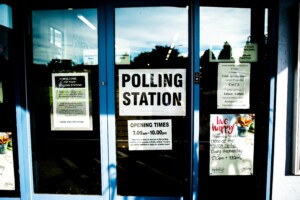Mayor of Bristol – What’s the Point? George Ferguson

Share this
George Ferguson CBE was the directly elected Mayor of Bristol 2012-2016. His work can be seen at www.peopleandcities.com. Follow him on Twitter @GeorgeFergusonx
This article is part of Bristol Ideas’ Referendum 2022 debate which looks at all aspects of city governance as part of ongoing work on democracy and the forthcoming May 2022 referendum.
“Don’t vote – Whoever you vote for the Council gets in!”
That was the graffiti of despair that I so well remember on a wall in St Pauls in the 1980’s. Bristol is good at ‘firsts’ – after all it’s written in our name, ‘Br1stol’, and it was in 1980 we had the first of the inner-city riots, before Brixton, Bradford and the rest. Not all our ‘firsts’ have been comfortable, but we are proud of our record of protest. I have always said that Bristol is a great city, not because of its leadership, but because of all those passionate individuals who give a damn. However, it is Bristol’s leadership and governance model we are talking about here.
The UK has one of the most centralised forms of government in Europe with a small proportion of taxes raised and retained locally, leaving our cities and counties constantly begging for more. Inspired by Michael Heseltine, a longtime champion of cities, the coalition government under David Cameron decided to start a process of devolving more power by emulating something of the US and continental model of city mayors but to give the choice to each city as to whether to adopt a mayoral system or not.
In May 2012 Bristol had another ‘first’ when it was the only city of a dozen or so across the country to vote to have a directly elected mayor. I had decided to campaign for this opportunity for two principal reasons. Firstly, many citizens were dissatisfied with what was perceived as an unstable local leadership, which was exacerbated by annual ward elections, by thirds, across the city, causing a near constant state of electioneering. And, secondly, because the possibility of clear independent leadership could moderate the party bickering that had plagued Bristol City Council for so long.
I had declared before the 2012 referendum that if Bristol voted to adopt the mayoral system I would stand as I had an ambitious programme for the city and I wanted to give the electorate the option of an independent and collaborative way forward. The odds against an independent candidate with no party organisation and funds beating a Labour candidate were extremely long and could only be achieved if the dominant party were caught with their trousers down, which certainly was unlikely to happen more than once!
On surprisingly winning in 2012 I was to enact two principal election promises. The first was to appoint a four-party ‘rainbow’ cabinet that reflected voting intentions and the make up of the council, although Labour at first refused to join. The second was to change the constitution to bring in four-yearly all-out elections to coincide with the mayoral election cycle. Both these were fundamental principles to me: one helped to address the democratic deficit that could otherwise come with a single party mayoral model that excludes other views, and the other reduced the constant electioneering that had been encouraged by an annual election system.
Now we are nearly ten years in – and we have had the experience of two very different mayors with different agendas, but both caring deeply about their city. The saving grace moving forward is that whatever happens we are most unlikely to revert to annual elections for Bristol. The sadness to me, though, is that now we have a very top-down approach with single party domination, giving the incumbent the ability to avoid proper scrutiny. I don’t see this changing under the current system.
What has changed fundamentally is that we now have a metro mayor, Dan Norris, who has, like Andy Burnham in Greater Manchester and Andy Street in Greater Birmingham (West Midlands), responsibility for the Bristol and Bath City Region (West of England). However, the difference is that the other two, along with nearly all other city regions, have a single mayor who in each case has won huge influence as the representative of their city region and benefitted their local economies and services as a result.
Bristol, like many cities, has burst out of its historic boundary, which is why it makes such sense to have a four-district combined authority, drawing North Somerset back into the fold to join Bath and North East Somerset, South Gloucestershire and Bristol, whose economies are so interdependent. Bristol’s Labour mayor and local party, however, oppose this on political grounds and seem to be doing all they can to undermine the metro mayor, which hardly encourages central government to give us the sort of powers and deals available to our Northern and Midlands equivalents.
So, I have come to the firm conclusion that we would most benefit by ending the elected mayoral system for Bristol and reverting to a fairer proportional system of governance that reflects representation across the city and council. The committee system has the advantage of giving all elected representatives a role and to appoint a council leader. This would enable us to work closely as a collaborative member of the combined authority and strengthen our influence with central government by swinging fully behind the metro mayor – of whatever political persuasion. Let’s grab the opportunity while we can!
Watch an interview with George Ferguson
George Ferguson – the first directly elected mayor of Bristol – looks at his experience as a councillor in the 1970s under the committee system in Bristol City Council; his time as mayor, the challenges he faced and the opportunities he grasped; the role of the metro mayor and what this means for the Bristol city mayor; and explains why he thinks a renewed committee system will be better for Bristol, democracy and trust.
Read the transcript of this conversation
Find out more about Bristol Ideas’ Referendum 2022 debate. Copyright of articles remains with the authors.


